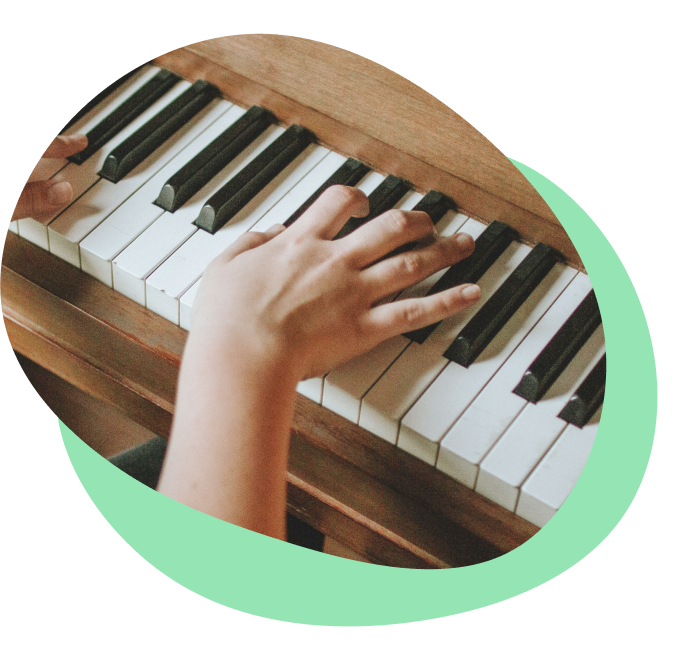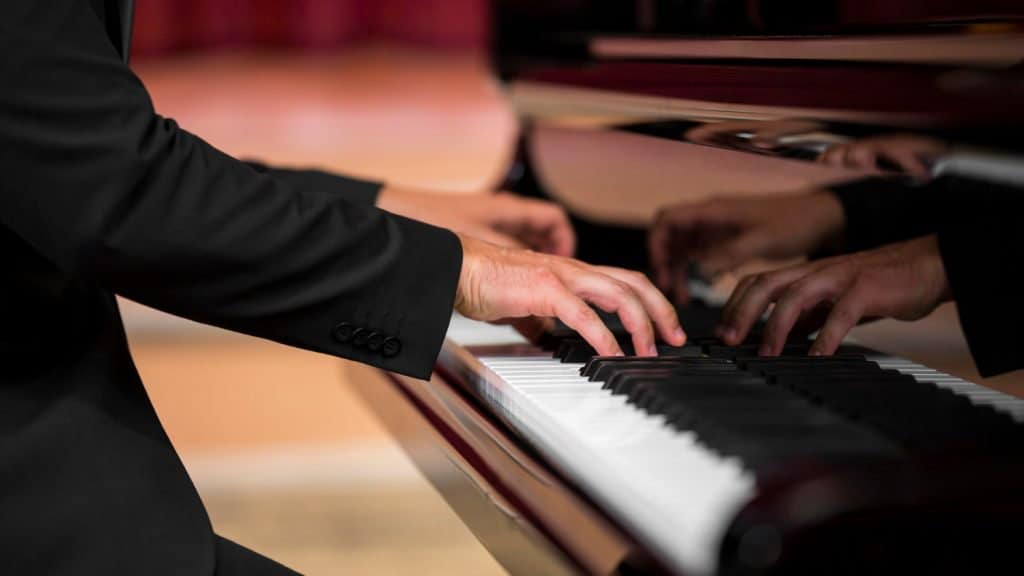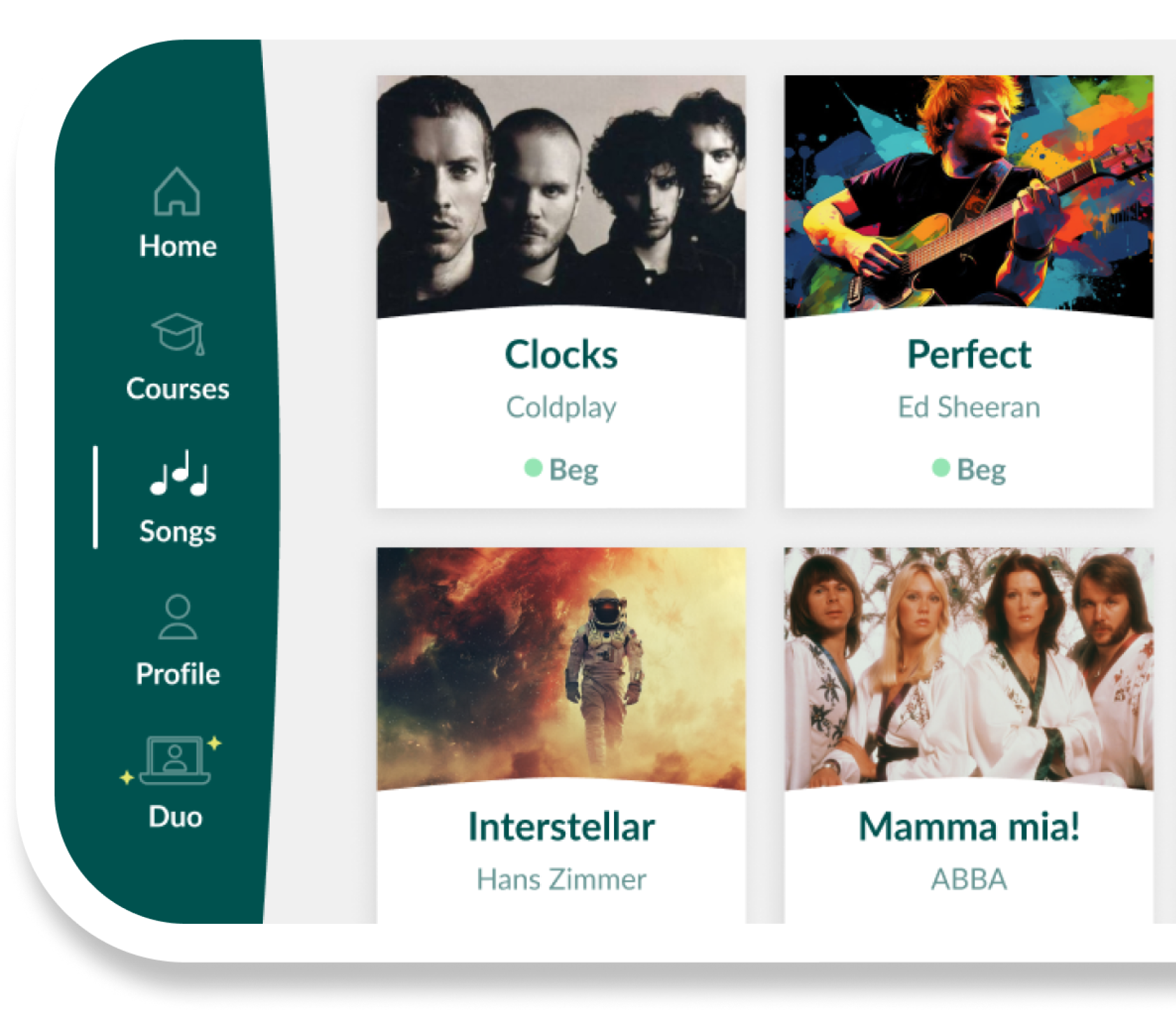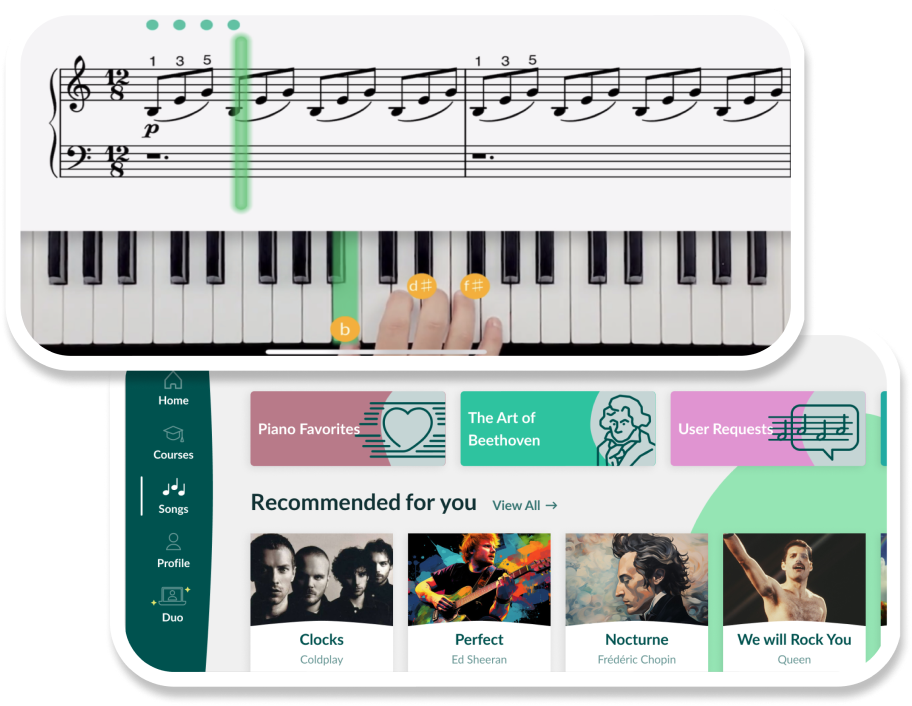Classical music for the piano is all around us – it’s become part of our everyday lives. As well as in concerts and on the radio, we hear it in television adverts, shopping malls, airplanes, elevators, and so much more! Now that you’ve started learning how to play piano you’re no doubt eager to learn all your favorite classical hits as soon as possible.
Fortunately this list will introduce you to a number of the best classical songs for piano; whether you’re a complete beginner, in the early stages of your musical journey, or a more experienced player, there’s sure to be something here for you!
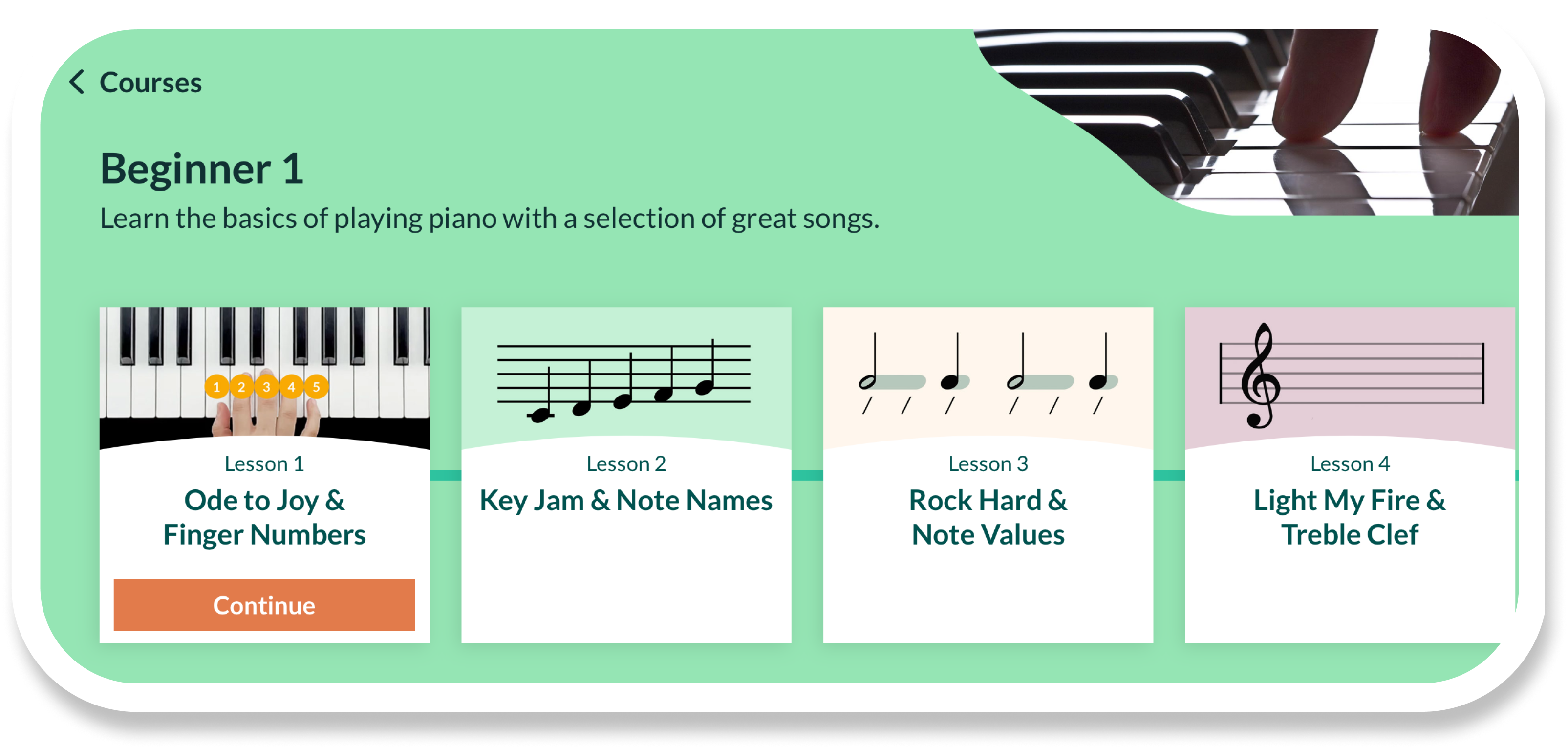
Top Skoove classical piano song lessons
[slide-anything id=”34114″]
Learning to read piano sheet music to master the classics!
When you start learning how to play piano it’s important to start with a song that can be easily understood by a beginner pianist, is in a simple time and rhythm, and has a catchy melody that’s easy to listen to.
Learning how to read sheet music will really help you enhance and focus your skills, but nonetheless it’s important to make sure that you select a song that matches your skill level. This article gives you a list of classical piano sheet music for beginners that you’ll find approachable, easy-to-follow, and informative.
And with plenty of practice, it’s only a matter of time before you’re ready to approach some of the more complicated classical piano sheet music out there!
Quick tricks for reading classical piano sheet music faster
To learn more about how to read classical piano sheet music, it’s recommended that you check out our guide. To summarize a few of the main points in this guide, note the following:
- Learn a few ‘landmark’ musical notes
By this, you should be able to see a note and recognize it in any context. As a pianist, it’s essential that you know where ‘middle C’ is. Once you can find ‘middle C’ without really thinking about it, knowing where all the other notes are becomes a whole lot easier!
- Learn and understand intervals
An interval is the gap between two notes on a piano. Being able to recognize intervals is so important as, over time, your fingers respond to the shape of the music meaning that you won’t have to spend as long thinking about every single note – it will just come to you almost naturally
- Use stepwise motion
Start by playing notes that are next to each other. By using Skoove, one of the best apps for learning piano, you’ll learn how to do this without needing to look down at the notes.
- Jump in thirds
Once you’ve grasped how to move up and down the piano using stepwise motion you can progress to reading skips (or thirds). Again, the Skoove app will help and teach you how to do this.
Easy classical piano sheet music to learn on piano
If you’re wanting to learn some classical piano sheet music for beginners, then look no further than Skoove! There are so many brilliant classical piano songs out there – some of it is hundreds of years old but nevertheless remains as popular and as influential as it did when it was first composed.
Beethoven’s ‘Ode to Joy’
Ludwig van Beethoven was a German composer, born in Bonn in 1770 but spent most of his life in Vienna. The famous tune ‘Ode to Joy’ in fact comes from his Ninth Symphony, which was first performed in 1824. The whole symphony is over an hour long and is considered one of the finest orchestral works ever to be written, but it’s the ‘Ode to Joy’ theme that has made it so famous and universally loved.
You can learn to play a simple version of the song here on Skoove.
![]() Please note that the lesson is also available on mobile app
Please note that the lesson is also available on mobile app
- Difficulty level: Beginner
- Key: C major
- Meter: 4/4
- Techniques: Stepwise movement; playing hands together; maintaining a steady pulse
Tips to play the song
- Practice each hand separately before putting both hands together
- Maintain a steady pulse/beat in the right hand melody
Interesting fact
By the time of the premiere of his Ninth Symphony in 1824, Beethoven was completely deaf. At the end of the performance he was unable to hear the audience applauding and had to be turned to face the audience and their standing ovation.
Debussy’s Clair de lune
‘Clair de lune’ by the French composer Claude Debussy is one of the most beautiful piano songs ever to have been written. It comes from the Suite bergamesque, composed in 1905, and is based on a poem by Paul Verlaine. It’s tune is instantly recognisable, having been heard in many films and television series, and the interactive Skoove lesson will teach you how to play it.
Interesting fact
Much of Claude Debussy’s music is in an impressionist style. This has its roots in the French impressionist artists such as Claude Monet, Pierre-Auguste Renoir, and Paul Cezanne, who were all contemporaries of Debussy.
![]() Please note that the lesson is also available on mobile app
Please note that the lesson is also available on mobile app
- Difficulty level: Advanced
- Key: Db major
- Meter: 6/8
- Techniques: Piano chords; playing a melody in thirds; legato piano playing
Tips to play the song:
- Use the piano pedals to help you achieve that smooth, legato sound
- Practice the scale of Db major a few times to get to know where all the accidentals are
Greig’s In the Hall of the Mountain King
‘In the Hall of the Mountain King’ is a famous piece of orchestral music by the Norwegian composer Edward Grieg, written in 1875 as part of his Peer Gynt suite. Its easily recognizable theme has helped it gain iconic status in popular culture, where it has been used in numerous films and television shows.
Have a go at learning this dramatic, powerful, march-like song on piano by following this lesson on the Skoove app.
![]() Please note that the lesson is also available on mobile app
Please note that the lesson is also available on mobile app
- Difficulty level: intermediate
- Key: B minor
- Meter: 4/4
- Techniques: March tempo; accidentals (black keys on a piano)
Tips to play the song:
- Memorize the left-hand part first, as it’s quite repetitive
- Watch out for the F# and C# in the key signature, as well as some of the extra accidentals
Interesting fact
The composer Edward Grieg used a “lucky frog” as his concert companion. Whenever he walked onto the stage as pianist or conductor, he would carry his beloved toy frog in his pocket. Today the frog is exhibited at Troldhaugen (Grieg’s house & museum) in Bergen, Norway.
Best neo-classical piano sheet music to learn on piano
Neo-classical music was a trend in the early twentieth century, particularly between the two world wars, in which composers sought to return to the aesthetic principles of the classical music era, namely order, balance, clarity, and emotional constraint. In some ways, neo-classical music is a bit like a crossover between classical piano and pop piano, or between jazz piano and classical piano.
Skoove’s brand new course will teach you some easy neo-classical piano sheet music, as well as some of the most popular and famous pieces of the genre.
Florian Christl’s ‘Fly’
Born in 1990, Florian Christl is a young composer, pianist, and arranger from Germany, and a real rising star in the contemporary classical world. His compositions reflect the beauty of nature and inner emotions. His single ‘Fly’ takes his classical-inspired songwriting to new, romantic heights. And now you can learn how to play it on Skoove, with a new lesson created in cooperation with Florian himself!
![]() Please note that the lesson is also available on mobile app
Please note that the lesson is also available on mobile app
- Difficulty level: intermediate
- Key: A minor
- Meter: 4/4
- Techniques: Piano chords; piano scales
Tips to play the song:
- Practice the left-hand piano chords and some piano scales first, before attempting to play the whole song
- Watch out for piano accidentals in some of the chords
Interesting fact
Florian Christl never formally studied piano, but the instrument became an obsession and as a child he spent every spare minute practicing and playing. Through this, he learnt the necessary skills to compose music on his own.
Johan Halvorsen’s ‘Passacaglia’
‘Passacaglia’ is a solo instrumental piece written by Johan Halvorsen, a Norwegian composer and pianist. It’s based on the ancient musical form of passacaglia, dating from the Baroque period of music (through composers like Handel and J. S. Bach). A passacaglia is essentially a series of variations over a repeating bass line.
![]() Please note that the lesson is available on mobile app
Please note that the lesson is available on mobile app
- Difficulty level: intermediate
- Key: A minor
- Meter: 4/4
- Techniques: Broken chords; chord arpeggios; pedaling technique
Tips to play the song:
- Keep the left-hand rhythm steady and consistent throughout
- The piece has a polyphonic texture, with multiple melodies happening simultaneously.
- Practice each melody individually before trying to put it all together.
Interesting fact
The passacaglia originated in Spain, and the word derives from the Spanish pasar (meaning “to walk”) and calle (meaning “street”). It was originally a strummed interlude between instrumentally accompanied dances or songs.
Yann Tiersen’s ‘Comptine d’un autre été’
The song ‘Comptine d’un autre été’ was made famous through the 2001 movie Amélie. Although you may not recognise the song’s title, you’ll certainly recognise the tune as it has grown to become one of the most-loved piano songs of recent years.
Tiersen is famous for writing long melodies accompanied by calm, simple bass lines. Have a go for yourself by checking out the Skoove lesson here.
![]() Please note that the lesson is available on mobile app
Please note that the lesson is available on mobile app
- Difficulty level: intermediate
- Key: E minor
- Meter: 4/4
- Techniques: Broken chords; arpeggios; soft pedal
Tips to play the song:
- Use the soft pedal for this song if possible, it makes it more atmospheric
- Watch out for the changing fingering on some of the sixteenth-notes
- You may want to learn the left-hand accompaniment first before trying to play hands together
Interesting fact
Amélie is a 2001 French-language romantic comedy set in Paris. It tells the story of a shy waitress who decides to change the lives of those around her for the better while dealing with her own isolation.
Learn the classics with us!
With Skoove you can learn not only the songs in the above list, but heaps more of the most popular, beautiful, tuneful classical hits in the history of music. With lessons for beginner, intermediate, and advanced players we’ve got everyone covered!
Check out the new courses that Skoove has recently released – our classical course will teach you all the famous pieces from Beethoven to Mozart, while our neo-classical course will introduce you to many favorites from more recent years.
You can sign up for your free 7-day trial today, and start learning all your favorite classics right away!
Conclusion
The lists in this article simply scratch the surface of the hugely different genres of piano music. There is so much music out there that your journey of discovery as a pianist is sure to be never-ending. Whatever styles of music you’re into, you’ll be sure to find some classical piano sheet music that really suits you.




